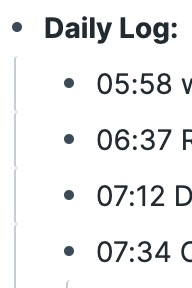Artificial Accountability

When sitting down to get work done, trying to follow through with a daily routine, or finding time to practice a new skill, it can be easy to get distracted. Your phone buzzes, or you get a notification, or you just feel a few moments of boredom and open up social media. Whatever the situation, it can easily turn into far too much time wasted.
One benefit of an open workplace is that there is some level of accountability from the presence of coworkers to not do much time wasting. You know that the occasional glance at your phone is fine, but people might start to wonder what you are doing if you stare at it for 30+ minutes! But many people don't work in that type of environment. It is hard to get the same effect when working from home.
This was one of my biggest challenges with productivity after I quit my job last year. It took more effort for me to stay on task and avoid getting distracted because I had no external accountability. And given the current Coronavirus situation I'm sure there are many other people facing similar difficulties now.
Now, you could try and get a friend to help be an accountability buddy, but then you need to make sure they have a way of being aware of what you are doing, and you need to get somebody to help with your problem. So is there a way to establish an artificial accountability system without pestering friends?
Enter, Toggl
I didn't quite make this connection at first, but recently I recognized that timing apps like Toggl can fill this role. I have been using Toggl more and more the last few months, but then about two days ago I ended up in a funk one day and just stopped using it and didn't start back up for about four days. During that time I realized that I was way less productive than I had been, but when I started back up immediately I started getting more done.
What I realized is that Toggl had been filling the role of an accountability partner. I had to tell it what I was working on, and it was keeping track of how long I spent on that task, which made me feel a certain amount of guilt if I did something other than what it was measuring. And I certainly didn't want to stop my writing timer to tell Toggl that I was browsing Reddit, that would feel crazy!
A similar result is completely possible to achieve with other solutions. I have recently switched to using a Daily Log system within Roam to do my timing in a way integrated into my journaling and idea capture. It works almost as well, although admittedly without the active timer counting up it is slightly less compelling of an accountability factor. I might need to start incorporating the Pomodoro technique again to add back in the active counting element.
 what the daily log looks like
what the daily log looks like
Alternative Approaches
There are ways of introducing artificial accountability beyond timer apps, and it is worth trying different options to find the best one for you. Whatever you do will need to be based on your own way of working, thinking, and behaving. There is no one size fits all method here.
One approach could be to encourage you to hold yourself accountable with a reward system. For example, if you keep yourself under a certain number of hours of social media time, you could reward yourself with a donut at the end of the week. Or reward yourself with a certain amount of video game time at the end of an otherwise productive day.
Rather than a carrot, you could also try a stick. Beeminder is a popular accountability system that allows you to track certain metrics using the site, and can have it automatically take money from you if you fail to follow your goals closely enough.
There are likely numerous other approaches out there, and again, try different options until you find out what works.
Rules of Engagement
Whatever approach you take, there are a few rules that can greatly increase your chance of success.
- Do a bit of planning and/or time blocking at the beginning of the day to know what you are supposed to be doing. This can be as high level or as detailed as you want, but having a plan will make it easier to know what to do next whenever you are ready to start a new timer and move on to something else.
- Be reasonable with yourself. Don't be overly strict or rigid with your approach or you will begin to mistrust your system and won't care as much if you ignore it.
- Make it hard to ignore. Keep a tab open somewhere with your timer running. You don't need it to be so visible as to be distracting, but make sure that every so often you will see it and remember that you have a system going.
With the above approaches and rules you should be able to conquer distractions and get more of what you want to out of every day. That is the power of artificial accountability.
One last thing.
If you enjoyed this post, consider signing up for my newsletter. Every week The Wednesday Writeup will come to you with an update on what I have been working on and thinking about, as well as recommendations for things to read and watch. You can check out the backlog and sign up at aengus.substack.com.
I don't have comments on this site, but I would also greatly appreciate any feedback via Twitter or Email.